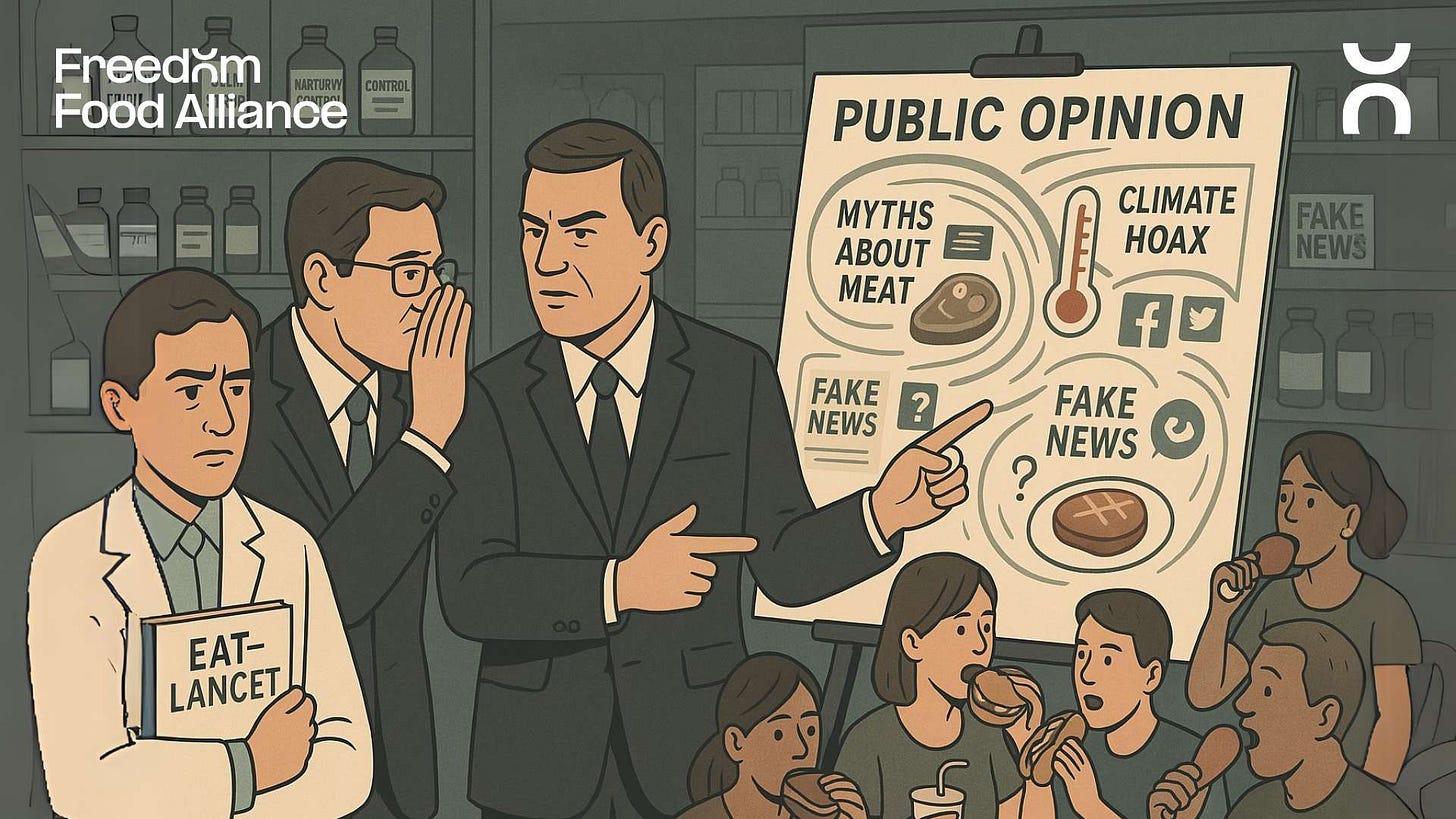Meat Industry's PR Campaign Exposed: Undermining Climate-Friendly Diets
How EAT-Lancet Came Under Fire: The Meat Lobby's Coordinated Smear Campaign
📍 Where and When
In 2019, the EAT-Lancet Commission released a groundbreaking report advocating for a global shift towards a "planetary health diet"—a balanced, predominantly plant-based diet aimed at promoting human health and environmental sustainability. The report recommended significant reductions in red meat consumption, especially in wealthier nations, to mitigate climate change and improve public health.
In our disinformation report from 2024, authored by Nicholas Carter, the Freedom Food Alliance unpacked the #YesToMeat campaign—a slick PR effort that masked corporate interests behind the guise of consumer choice and cultural pride. Our report revealed how front groups and influencer partnerships were used to normalize the overconsumption of meat while undermining credible science on sustainable diets. You can read the full report here and explore how these tactics exposed strategy against the EAT-Lancet Commission on its first release.
Fast-forward to today. A recent investigation by DeSmog and The Guardian has uncovered that the intense backlash against the EAT-Lancet report was not as organic as many had thought. Instead, it was significantly fueled by a coordinated public relations campaign orchestrated by the meat and dairy industry.
❓ Why It Matters
The EAT-Lancet report was a significant scientific endeavor, involving 37 experts from 16 countries. It provided a comprehensive framework for transforming the global food system to address the dual challenges of feeding a growing population and combating climate change. The report's recommendations were based on extensive research and aimed to balance nutritional needs with environmental sustainability.
The revelation that the meat industry actively sought to discredit this report highlights the lengths to which vested interests will go to protect their profits, even at the expense of public health and the planet.
👥 Who’s Behind It
At the center of the smear campaign was Red Flag, a PR firm known for representing clients in the meat and dairy sectors. Acting on behalf of the Animal Agriculture Alliance—a coalition that includes industry giants like Cargill and Smithfield Foods—Red Flag orchestrated a comprehensive strategy to undermine the EAT-Lancet report.

Their tactics included briefing journalists, think tanks, and social media influencers to portray the report as "radical," "out of touch," and "hypocritical." The campaign successfully generated over 500 negative articles and thousands of critical social media posts, significantly outnumbering positive or neutral coverage.
📉 What Happened
The orchestrated backlash had tangible consequences. The World Health Organization (WHO), initially set to host the report's launch event, withdrew its support following the negative media storm. Scientists involved in the report faced personal attacks, leading some to retreat from public engagement and media promotion of their work.
This campaign effectively shifted the narrative, turning a scientifically grounded report into a contentious cultural issue, thereby stalling meaningful discourse on necessary dietary changes for climate mitigation.
🔍 What's Next
The exposure of this disinformation campaign underscores the urgent need for transparency and accountability in how food industry lobbying influences public discourse and policy. It also highlights the importance of supporting independent scientific research and protecting it from manipulation by vested interests.
Moving forward, there is a critical need for:
Policy Reforms: Implementing regulations to limit the influence of industry-funded PR campaigns on public health and environmental policies.
Public Awareness: Educating consumers about the tactics used by industries to manipulate information and public opinion.
Support for Science: Ensuring that scientific findings, especially those related to public health and climate change, are communicated effectively and protected from disinformation.
✅ Take Action
Demand Transparency: Advocate for policies that require full disclosure of funding sources for PR campaigns and lobbying efforts.
Support Independent Media: Encourage and support journalism that investigates and exposes disinformation campaigns such as Sentient Media, Desmog and Green Queen
Educate Yourself and Others: Stay informed about the tactics industries use to influence public opinion and share this knowledge within your community.





My papers on livestock and GHG emissions - Jim Dyer
https://journals.bilpubgroup.com/index.php/jees/article/view/7811
https://www.mdpi.com/2073-4395/8/9/190
https://doi.org/10.54175/hsustain1020008
https://doi.org/10.3390/atmos12080945
https://doi.org/10.3390/su12135466
https://doi.org/10.1016/j.jclepro.2020.121785
https://www.youtube.com/watch?v=t0AxQwQQ3FE
http://dx.doi.org/10.1080/10440046.2010.493376
Fascinating, Robbie! Also depressing. Damn it seems like every destructive industry — lead, asbestos, toxic chemicals, tobacco, coal, beef — defends the indefensible. 😔